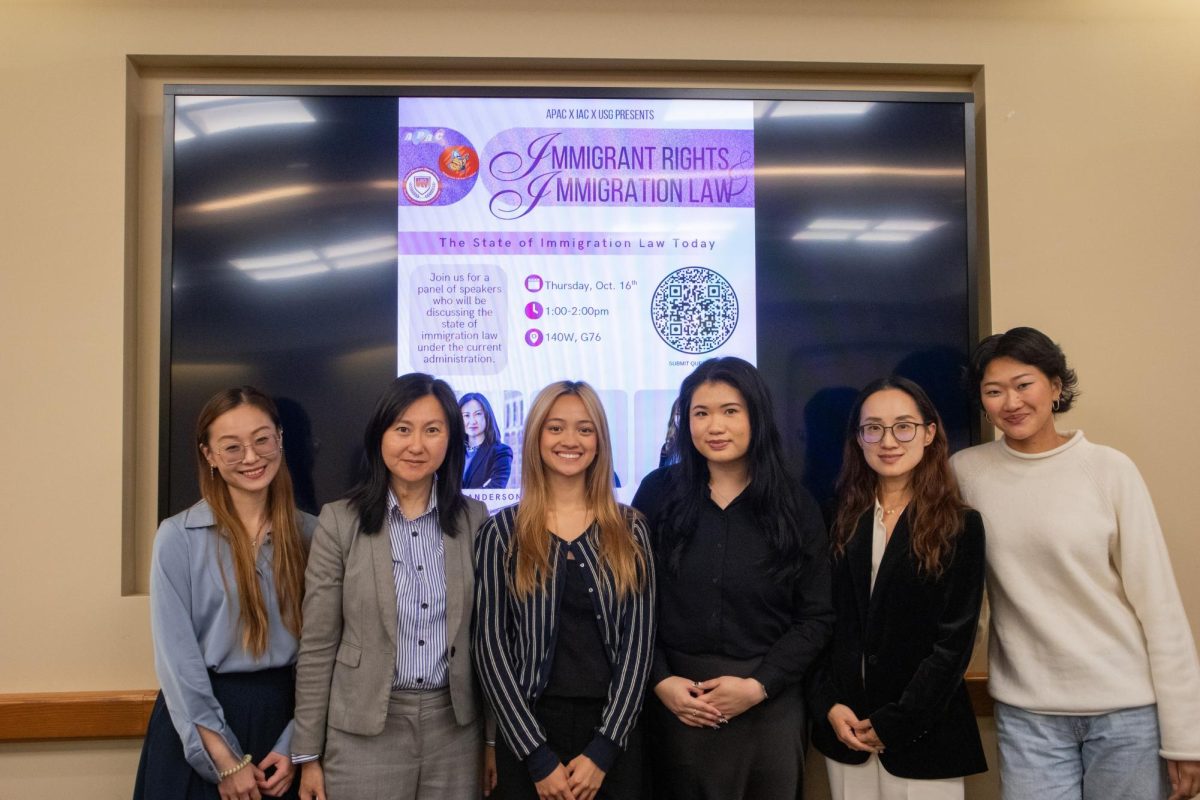The Oct. 16 “Immigrant Rights and Immigration Law” discussion panel brought together legal professionals to address uncertainty around U.S. immigration policies, offer advice on visa applications and guide students who want to pursue immigration law at the Lincoln Center campus.
The event was co-hosted by the Immigration Advocacy Club, United Student Government and the Asian Pacific American Coalition.
As rapidly changing federal regulations continue to affect students and families, questions surrounding legal status and rights have grown increasingly urgent.
The panelists, who all possess over a decade of experience, discussed how immigration law evolves in accordance with each presidential administration’s priorities.
Yen-Yi Anderson, founder and managing principal at Anderson and Associates Law, P.C., advised students to keep track of their immigration status and ensure that their I-20 and visa documents are up to date.
Susan Song, an immigration attorney at Fragomen, said the current administration’s emphasis is on protecting national security through increased enforcement of visa regulations. For example, when applying for an immigrant visa, people must now apply only through their country of residence or a country in which they have citizenship. Prior to this, applicants could request a visa at a U.S. consulate in a nearby country, even if they were not residents of that country.
Customs and Border Patrol have also increased scrutiny at borders by conducting greater numbers of, and more thorough, background checks.
Given this shift, Yen-Yi Anderson, founder and managing principal at Anderson and Associates Law, P.C., advised students to keep track of their immigration status and ensure that their I-20 and visa documents are up to date.
Anderson explained the importance of attending classes and maintaining a full course of study for international students. She suggested that students utilize campus resources and seek help from faculty if they are struggling. Maintaining legal status requires full-time enrollment, so absences and unpaid tuition balances can compromise this status. The Department of Homeland Security website provides further information on this, stating that students must speak with their designated school officer prior to changing addresses, transferring schools, switching their major or taking a leave of absence.
Regarding Immigration and Customs Enforcement (ICE), Anderson strongly recommended that, should students be approached, they stay calm in order to not give officers any reason for concern. As long as students are compliant in their F-1 visa status, they should not worry, as ICE cannot make arrests without a judicial warrant. If someone is approached at their home, they can refuse to open the door and request that the officers slip a warrant underneath it.
Anderson also advised that students obtain and carry IDNYC cards as their primary form of identification, rather than their foreign passports, as IDNYC cards provide proof of residency. International students aged 18 or older are expected to carry documentation at all times.
As Song elaborated further on the particulars of legal status, she noted that a criminal record, to ICE, constitutes a citation or charge, even without a conviction. She also added that, now, arrests may happen at adjustment of status interviews, so it is important to be alert at consulates and not spend unnecessary time there.
As immigration lawyers, Song and Anderson described the fulfillment they gain from helping people receive authorization for their legal status. They agreed on the crucial importance of immigration law and its increasing relevance given rapid federal changes to visa regulations.
“You’ll find that it’s very intellectually challenging and you also find that your work will help a lot of people, your community or the community that you care about.” Susan Song, an Immigration Attorney at Fragomen
The panelists also concurred on the importance of students aspiring toward careers in international law to be willing to advocate for justice, fight difficult cases and contest policies in court.
“You’ll find that it’s very intellectually challenging and you also find that your work will help a lot of people, your community or the community that you care about,” Song said.
To get a head start on their careers, students can volunteer or intern with organizations like legal aid societies, nonprofit organizations, bar associations, pro-bono clinics and more. These organizations provide training on how to guide people applying for citizenship status and other legal immigration processes.
For students looking to help outside of a legal career, Song suggested aiding people facing linguistic barriers who may run into difficulty when updating their documents or speaking to officers. She also touched on the importance of simply checking in on one’s peers and offering emotional support.
International students should be advised that federal visa regulations are subject to continuous change.

